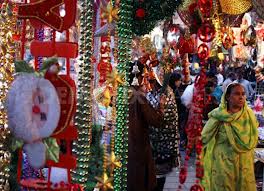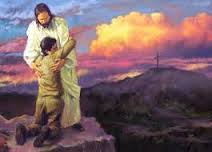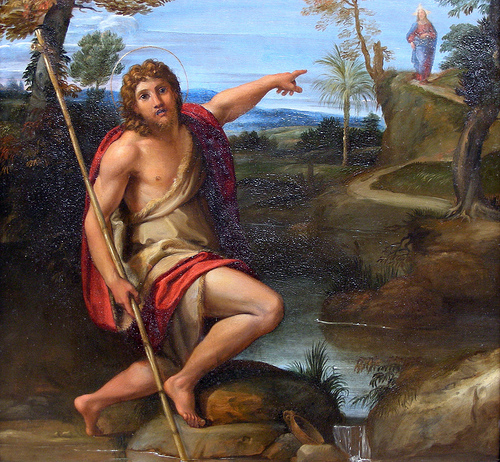
************************************************************
-04-12-2022-
Second Sunday of Advent
vs.1 In due course John the Baptist appeared; he preached in the wilderness of Judaea and this was his message:
vs.2 “Repent, for the kingdom of heaven is close at hand.”
vs.3 This was the man the prophet Isaiah spoke of when he said: “A voice cries in the wilderness: ‘Prepare a way for the Lord, make his paths straight.’”
 vs.4 This man John wore a garment made of camel-hair with a leather belt around his waist, and his food was locusts and wild honey.
vs.4 This man John wore a garment made of camel-hair with a leather belt around his waist, and his food was locusts and wild honey.
vs.5 Then Jerusalem and all Judaea and the whole Jordan district made their way to him,
vs.6 and as they were baptised by him in the river Jordan they confessed their sins.
vs.7 But when he saw a number of Pharisees and Sadducees coming for baptism he said to them,
vs.8 “Brood of vipers, who warned you to fly from the retribution that is coming? But if you are repentant, produce the appropriate fruit,
vs.9 and do not presume to tell yourselves, ‘We have Abraham for our father’, because, I tell you, God can raise children for Abraham from these stones.
vs. 10 Even now the axe is laid to the roots of the trees, so that any tree which fails to produce good fruit will be cut down and thrown on the fire.
vs.11 I baptise you in water for repentance, but the one who follows me is more powerful than I am, and I am not fit to carry his sandals; he will baptise you with the Holy Spirit and fire.
vs.12 His winnowing-fan is in his hand; he will clear the threshing-floor and gather his wheat into the barn; but the chaff he will burn in a fire that will never go out.”
************************************************
We have four sets of homily notes to choose from.
Please scroll down the page to read them.
Michel DeVerteuil : Michel, a Holy Ghost Priest, fmr director of the Centre of Biblical renewal in Trinidad .
Thomas O’Loughlin: Thomas is on the theology faculty of Nottingham University
John Littleton, Cashel Diocese, Director of the Priory Institute for distant learning, Tallaght, D24
Donal Neary SJ: Donal is editor of The Sacred Heart Messenger
*******************************************************
Michel de Verteuil
Lectio Divina with the Sunday Gospels – Year A
www.columba.ie
General comments
This is a long passage with many themes worked into it. Identifying the different themes before starting your meditation will help you to enter into the passage.
Verses 1 to 5 summarise the story of John the Baptist, but even in this section there are various points being made: the fact that John preached in the wilderness; that he appeared ‘in due course’, meaning at the time fixed by God; that he was fulfilling the prophecy of Isaiah.
The text of Isaiah in verse 3 is often misunderstood. What it is saying is that prophets always announce to people who are experiencing lostness and abandonment that they can relax because God is going to show himself to them.
In verse 4 the Baptist’s garments are symbolic: they are the traditional garments of the prophets. His diet is simple and taken from the environment. The rest of the passage gives us individual teachings of John the Baptist, each of them symbolic and a typical teaching of a prophet.
In verse 7-9 the mentality of all who are complacent is exposed, one that we will certainly recognise as typical of us who are religious people.
Verse 10 expresses dramatically an experience of a ‘coming of the Son of Man’.
Verse 11 gives us an insight into the spirituality of John the Baptist, as of all who are involved in a work of God. There is deep humility combined with trust in our particular vocation.
Verse 12 is another dramatic image of God’s coming and its effects. In your meditation you can enter into it as a message of comfort in a time of fear.
Scriptural Prayers
Lord, we thank you for conversion experiences:
– a parish retreat;
– a serious illness;
– one of our friends telling us off;
– meeting a great person.
At the time we were drifting, wrapped up in our own concerns.
 Then this John the Baptist appeared;
Then this John the Baptist appeared;
he spoke to us in our wilderness and his message was simply this:
we must re-think our values totally.
We recognise that this was the experience the prophets spoke of
when they said that no matter how desolate the wilderness we find ourselves in,
you will speak to us there.
In fact, we can prepare for your coming. Thank you, Lord.
Lord, we thank you for what has happened in South Africa and Northern Ireland
We thank you for the great leaders who in due course appeared in that wilderness,
Nelson Mandela, Walter Sisulu, Desmond Tutu, Allan Boesak and recently Queen Elizabeth in a visit to Ireland.
Like John the Baptist they wore the garments of the ancient prophets,
nourishing themselves from the resources of their culture,
and proclaiming that a decisive moment has come
and the country must take a new path.
We thank you that the people responded.
As in the time of John the Baptist, when Jerusalem and all Judaea
and the whole Jordan district made their way out to him,
so today the people are abandoning their passivity,
confessing that they have played their part in the system,
and committing themselves to the new South Africa.
Naturally some are coming forward like the Pharisees and Sadducees
only because they wish to escape from the violence that is coming,
but your leaders are challenging them
and calling on them to produce the appropriate fruit.
 “We wish to remind all how crucial is the present moment, how urgent the work to be done. The hour for action has now sounded. At stake are the peace of the world and the future of civilisation.” …Pope Paul VI, Populorum Progressio, 1967 and his famous insight, There can be no peace without justice
“We wish to remind all how crucial is the present moment, how urgent the work to be done. The hour for action has now sounded. At stake are the peace of the world and the future of civilisation.” …Pope Paul VI, Populorum Progressio, 1967 and his famous insight, There can be no peace without justice
Lord, we thank you that recent popes have been John the Baptist,
preaching to the wilderness of the modern world
that a moment of decision is at hand,
that even now the axe is laid to the roots of our civilisation
and if it does not produce good fruit it will be cut down and thrown on the fire.
Lord, don’t let us Christians presume that we can escape this retribution
because we are the children of Abraham;
remind us that you can raise children for Abraham from stones.
“The great problem for the church today is not survival but prophecy.” …Thomas Merton
Lord, as a church, we often wonder why more people don’t make their way to us,
ask for baptism and confess their sins.
Perhaps it is that we do not wear the garments of the prophets,
and we do not nourish ourselves from the simple wisdom of our culture.
Lord, we thank you for those who continue to bring the gospel message
in areas of society which are looked down upon
– the worker priest;
– those who work with gay people or with prostitutes;
– Alcoholics Anonymous.
They proclaim in the wilderness that you are there
and all people need is to open themselves to your presence.
Lord, we thank you for the deep joy of knowing, like John the Baptist,
that we are the humble servants of your great work,
that others will follow us who will be more powerful than we are,
and so we can be content to baptise with water for repentance
because others will baptise with the Holy Spirit and with fire.
Lord, evil discourages us
– the evil within ourselves, in our church community, in society.
We thank you that every once in a while you send us people like John the Baptist
who remind us that you are there with your winnowing fan in your hand
and you will clear your threshing floor.
All that evil which frightens us, you will burn in a fire that will never go out,
whereas goodness which seems so frail to us is your precious wheat which you will gather into your barn.
*******************************************
Thomas O’Loughlin,
Liturgical Resources for Advent and Christmas
www.columba.ie
Introduction to the celebration
Christmas is coming! If you are not already busy preparing, then you will have at least heard many people telling you it is time you started getting ready. This year we are all facing available energy and financial deficits and even Covid leftovers. As the people of God we need to start thinking about the welcoming of the Christ and the preparations that we are called upon to make as disciples. We must prepare the way for the Lord to enter our lives, to enter the lives of those around us, and to enter into our world with his word of peace and forgiveness.
Homily notes
1. Do you know this rhyme?
‘Christmas is coming, The goose is getting fat,
Please put a penny in the old man’s hat.‘
A few simple comments on this little rhyme can provide a checklist for people to remind themselves of what we celebrate during Advent.
2. Christmas is coming.
 This is a time when preparation is everywhere in the air: preparations for holidays, for all the festivities, buying presents, sending cards, arranging food, everyone is ‘ getting ready’. Everyone is looking forward to the period around 25th December. ‘Looking forward’ and ‘getting ready’ are basic Christian activities: we are looking forward to the coming of the kingdom, we are looking to the return of the Christ in glory. We are looking forward to the life of the world to come. We are always getting ready to be better disciples, to be witnesses, to be the eyes and hands and feet of Jesus. What we are looking forward to right now and working so busily to prepare for is ‘Christ Mass’: the Christian feast. The feast that proclaims that the Son of God has come among us, walked with us, talked with us, suffered with us, and offered us adoption as daughters and sons of God. He is coming among us now, and will come again to judge the living and the dead.
This is a time when preparation is everywhere in the air: preparations for holidays, for all the festivities, buying presents, sending cards, arranging food, everyone is ‘ getting ready’. Everyone is looking forward to the period around 25th December. ‘Looking forward’ and ‘getting ready’ are basic Christian activities: we are looking forward to the coming of the kingdom, we are looking to the return of the Christ in glory. We are looking forward to the life of the world to come. We are always getting ready to be better disciples, to be witnesses, to be the eyes and hands and feet of Jesus. What we are looking forward to right now and working so busily to prepare for is ‘Christ Mass’: the Christian feast. The feast that proclaims that the Son of God has come among us, walked with us, talked with us, suffered with us, and offered us adoption as daughters and sons of God. He is coming among us now, and will come again to judge the living and the dead.
3. The goose is getting fat.
If God has sent his Son among us, then this is a cause for joy. We as Christians can be truly party animals for we are celebrating the depths of the Father’s love. It is right that we should have the great party that the thought of a fat goose brings to mind. We are a loved and redeemed people: we have more to celebrate than we can even imagine.
4. Please put a penny in the old man’s hat.
But if we rejoice that the Father loves us and has sent his Son among us, then it also make demands on us. Being disciples means we have to be doers. We cannot be indifferent to sufferings and needs of others.
God loves us, we must love others;
God has forgiven us, we must forgive others;
God provides for us in our need, we must provide for others.
We cannot party with honest hearts until we have sought to relieve suffering. The image of the old man with his hat on the ground in front of him begging reminds us of all the work we must do to bring about the kingdom.
Christians rejoice as we wait for the Lord when he comes again in glory to say:
‘Come, you that are blessed by my Father, inherit the kingdom prepared for you from the foundation of the world; for I was hungry and you gave me food, I was thirsty and you gave me something to drink, I was a stranger and you welcomed me, I was naked and you gave me clothing, I was sick and you took care of me, I was in prison and you visited me. Truly I tell you, just as you did it to one of the least of these who are members of my family, you did it to me.’ (cf Mt 25:34-40).
***********************************
John Littleton
Journeying through the Year of Matthew
www.Columba.ie
Reflection
John the Baptist was the last in a long line of prophets who foretold the coming of the Messiah. He prepared the way for the Messiah by alerting God’s people to the Messiah’s impending arrival and by challenging them to change their lives by repenting for their sins. A radical abandonment of sinful living was required because God was going to communicate with his people directly through his Son, Jesus, the Messiah.
 John’s ministry focused on preaching conversion and proclaiming a baptism of repentance for the forgiveness of sin. Repentance is a fundamental change of heart, or attitude, which results in leaving sin behind and embracing God’s freely shared life and love. Such change is only possible with the gift of God’s grace. There was urgency in John’s preaching about repentance. The time for repentance, he said, is now, not in the future. Repentance through prayer, fasting and charitable works leads to conversion, and conversion is an important aspect of people’s preparation if they are to meet Christ when he comes.
John’s ministry focused on preaching conversion and proclaiming a baptism of repentance for the forgiveness of sin. Repentance is a fundamental change of heart, or attitude, which results in leaving sin behind and embracing God’s freely shared life and love. Such change is only possible with the gift of God’s grace. There was urgency in John’s preaching about repentance. The time for repentance, he said, is now, not in the future. Repentance through prayer, fasting and charitable works leads to conversion, and conversion is an important aspect of people’s preparation if they are to meet Christ when he comes.
John understood from his own experience in the wilderness, where he spent a long time in prayer and reflection, that repentance and conversion were absolutely necessary. Otherwise their hearts would remain closed by sinful preoccupations and they would not be able to recognise the Messiah when he arrived. And, if they could not recognise him, neither would they be able to acknowledge him as the fulfilment of God’s promise to liberate his people. Without a ‘change-of-heart’ (metanoia in the original Greek), a turning back towards God, there could be no appreciation of the Messiah’s presence among them.
We learn from the gospels that John fasted and did penance, wore camel hair and ate locusts and wild honey. So there was a strong witness dimension in his efforts to prepare the way for Christ to come into the people’s lives. He was courageous and unapologetic in how he spoke. This witness and courage provided him with great credibility and, consequently, many people felt invited to consider seriously the relevance of his message because they noticed how he had taken it to heart himself. But his preaching made him unpopular with some people because they could not accept the truth, and remained unrepentant.
In what ways are we repentant people?
How do we demonstrate our sincerity as witnesses to the teaching of Christ and the Church?
What does it mean to be courageous and unapologetic about our convictions? The reality is that some of us are unrepentant for our sins. We are reluctant to speak about our faith and share it with others. Advent challenges us to become people of hope and expectation as we await Christ’s coming.
As we prepare for Christmas, how will we prepare ourselves and help others to prepare for the arrival of the Messiah? If we follow the example of John the Baptist, we will truly be Advent people.
Meditation : Repent, for the kingdom of heaven is close at hand. (Mt 3:2)
********************************
Donal Neary SJ
Gospel Reflections for Sundays of Year A: Matthew
www.messenger.ie/bookshop/
The straight way
Before the motorways a journey took ages, with twists and turns, corners and hills. Now much has been made straight.
John’s message was that we would live along a path where words and actions match, and where kindness matches convictions.
 John the Baptist was a man on one mission – to be the messenger of the one he did not know. His life had a vision and a purpose, like when we are really committed to people or to causes or to the poor or to peace in the world. John was the man of desert food and desert dress; he took time out to find what the biggest thing in life was and then kept following it, often not knowing where it would go.
John the Baptist was a man on one mission – to be the messenger of the one he did not know. His life had a vision and a purpose, like when we are really committed to people or to causes or to the poor or to peace in the world. John was the man of desert food and desert dress; he took time out to find what the biggest thing in life was and then kept following it, often not knowing where it would go.
 The human heart is complicated and we know that. We need that one who will touch our hearts with love and forgiveness and guide us himself in ways that are straight, and whose hand will guide us along straight paths when we need it.
The human heart is complicated and we know that. We need that one who will touch our hearts with love and forgiveness and guide us himself in ways that are straight, and whose hand will guide us along straight paths when we need it.
God’s guiding is gentle. John found that Jesus was a gentler guide: no name-calling, no bringing the axe to the tree, but calling each of us his friend, and nourishing the tree rather than cutting it down.
Jesus would melt the snow to make a path, not hack at it and destroy in the process. Our hearts can be melted by the love of God and love of others.
Think of, or remember a time when you made a decision to follow the way of Jesus. Offer this to him again.
Lord God, make our hearts like yours.